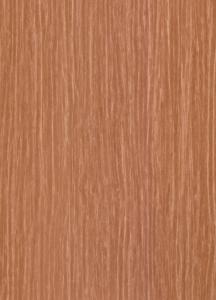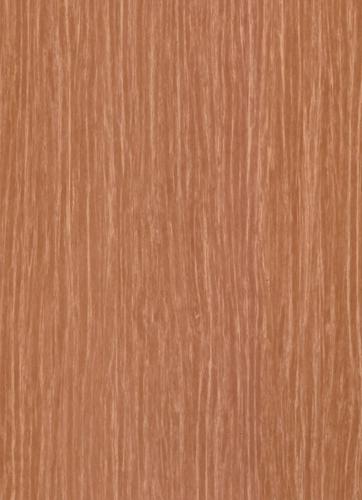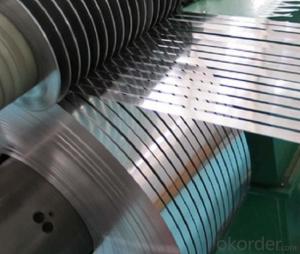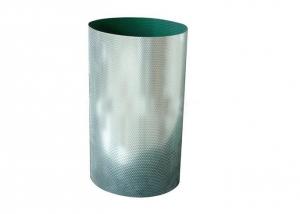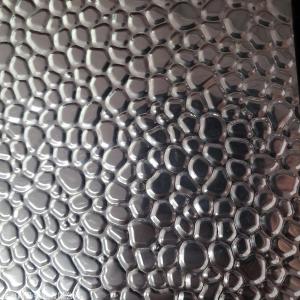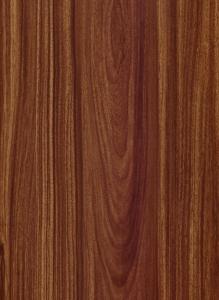Customized Embossed Aluminum Coil with Wood Grain
OKorder Service Pledge
OKorder Financial Service
You Might Also Like
Aluminium coated sheetand coil choose aluminium sheet coil as raw material, after de-ester, cleaning,passivation layer processing, and then painting on this basis, the paint areprovided by famous international companies like PPG and Valspar from UnitedStates or Becker from Sweden, represent the most advanced level in the world.After the test of exposure by natural light in Florida, the quality assurance is more than morethan 20 years. As poor performance of color coated steel corrosion, rust,yellow rust after a large amount of the deficiency of serious impact on thebuilding's overall appearance. However, because of the advantages of rawmaterials, Aluminium coated coil have a high strength, corrosion resistance,high weather resistance, can be used recycle, save energy and protect theenvironment and other characteristics. Not only have the same strength with colorcoated steel, but also overcome the shortage of color coated steel. So, the Aluminiumcoated coil has been widely used as roofing and ceiling decorative envelopesystem board in modern constructions like large factories, exhibition halls,stadiums, airports, train station hospital and so on. We can choose Aluminiumcoated coil in different thickness and color, by cutting, pressing, punching,bending and other follow-up molding process for large span, the larger theoverall roofing, wall decorative panels used in construction; or cut them intosmall panels by bending, stamping mold or other processing for indoordecorative roofing plate; we can also composite them with polyurethane foam oraluminium honeycomb for energy-saving decorative wall plates.
Alloy | 1050,1060,1100,3003,3004,3005,3104,3105,5052,5005,8011 |
Temper | O,H42,H44,H46,H48 |
Thickness (mm) | 0.25mm-1.5mm for aluminium coated coil; 1.50mm-4.0mm for aluminium coated sheet. |
Width (mm) | 100mm to 2000mm |
Length (mm) | 800mm to 6000mm for sheet |
- Q: What are the different types of aluminum alloys used for making coils?
- There are several different types of aluminum alloys that are commonly used for making coils. These alloys are specifically chosen for their unique properties and characteristics, which make them suitable for various applications. Some of the most widely used aluminum alloys for coils include: 1. Aluminum 1100: This alloy is pure aluminum and is known for its excellent corrosion resistance, high thermal conductivity, and good formability. It is often used in applications where high electrical conductivity is required, such as in transformers or electrical coils. 2. Aluminum 3003: This alloy is known for its moderate strength and excellent workability. It has good corrosion resistance and is often used in applications where formability and resistance to atmospheric corrosion are important, such as in condenser coils or evaporator coils for HVAC systems. 3. Aluminum 5052: This alloy is known for its high strength, excellent corrosion resistance, and good weldability. It is often used in applications where strength and resistance to saltwater corrosion are critical, such as in marine or offshore applications. 4. Aluminum 6061: This alloy is known for its high strength, good corrosion resistance, and excellent machinability. It is often used in applications where high strength and good weldability are required, such as in heat exchanger coils or automotive cooling coils. 5. Aluminum 7075: This alloy is known for its very high strength and excellent fatigue resistance. It is often used in applications where extreme strength and resistance to stress are crucial, such as in aircraft or aerospace components. These are just a few examples of the different types of aluminum alloys used for making coils. The specific alloy chosen depends on the requirements of the application, such as strength, corrosion resistance, formability, or electrical conductivity.
- Q: Are there any specific guidelines for the storage of aluminum coils?
- Yes, there are specific guidelines for the storage of aluminum coils. Aluminum coils should be stored in a dry, well-ventilated area to prevent moisture buildup and corrosion. They should be stacked horizontally on a level surface, with proper support to avoid deformation. Additionally, it is recommended to cover the coils with a protective material, such as plastic or cloth, to prevent dust, dirt, or other contaminants from accumulating on the surface.
- Q: This question is asking for a comparison of various types of aluminum coils, highlighting their unique characteristics and uses.
- <p>Aluminum coils are differentiated by their thickness, alloy composition, surface treatment, and temper. Common types include 1000 series coils with high purity, 3000 series known for formability, 5000 series for corrosion resistance, and 6000 series for strength. Thickness varies from thin gauges used in packaging to thick ones for construction. Surface treatments can include anodizing, painting, or lacquering for enhanced properties. Temper refers to the hardness and strength, with 'H' for hard and 'O' for soft tempers. Each type serves specific industries, such as automotive, aerospace, construction, and packaging.</p>
- Q: How are aluminum coils tested for flatness?
- Aluminum coils are typically tested for flatness using a variety of methods, including visual inspection, mechanical measurement, and advanced technologies like laser scanning. The visual inspection involves examining the surface of the coil for any visible signs of waviness or distortion. Mechanical measurement techniques involve placing the coil on a flat surface and using specialized tools to measure its flatness by checking for any deviations from the ideal flat plane. Laser scanning is another method where a laser beam is directed across the surface of the coil, and the reflected beam is analyzed to determine the flatness of the coil. These testing methods ensure that aluminum coils meet the required flatness standards for their intended applications.
- Q: How long do aluminum coils last?
- The longevity of aluminum coils can differ based on various factors including maintenance, usage, and environmental conditions. On average, aluminum coils that are well-maintained can endure for approximately 15 to 20 years. Nevertheless, with appropriate care and consistent cleaning, certain aluminum coils have been reported to endure even longer, reaching up to 30 years or beyond. It is crucial to emphasize that regular upkeep, such as coil cleaning, inspection for damage or corrosion, and ensuring proper airflow, can greatly increase the lifespan of aluminum coils. Furthermore, elements like exposure to severe weather conditions, levels of humidity, and the quality of installation can also have an impact on the durability of aluminum coils.
- Q: Dongying power plant with 0.6mm thick insulation aluminum coil, manufacturers can be divided into small volumes?
- Yes, 50 meters per roll. I have a manufacturer's telephone number
- Q: What are the different coil widths available for aluminum coils?
- The available coil widths for aluminum coils may vary based on specific requirements and manufacturing capabilities. However, typical coil widths for aluminum coils range from 12 inches (304.8 mm) to 60 inches (1524 mm). These standard widths are commonly utilized in construction, automotive, and packaging industries. Custom coil widths, narrower or wider than the standard range, can also be provided by manufacturers to meet specific customer needs. This allows for increased flexibility in design and application. It is important to acknowledge that the availability of specific coil widths may differ depending on the supplier and the aluminum alloy used. Therefore, it is advisable to consult a reputable aluminum coil supplier to determine the exact range of coil widths available for a particular project or application.
- Q: What are the applications of aluminum coils?
- Aluminum coils have a variety of applications across industries. They are commonly used in the manufacture of HVAC systems, where they serve as heat exchanger components. Aluminum coils are also widely used in the construction sector for roofing, cladding, and insulation purposes. Additionally, they find application in the automotive industry for radiators, condensers, and evaporators. The electrical and electronic sectors utilize aluminum coils in transformers, motors, and power cables. Moreover, aluminum coils are employed in the packaging industry for making cans, foils, and closures.
- Q: Explain the distinctions among various types of aluminum coils, including their properties and applications.
- <p>Aluminum coils are differentiated based on their alloy composition, thickness, temper, and surface finish. Common types include 1000 series coils, which are pure aluminum with high ductility but low strength; 3000 series, known for their formability and used in cookware; 5000 series, which are non-heat-treatable and corrosion-resistant; and 6000 series, offering a balance of strength and corrosion resistance. Thickness varies from thin gauges for flexible applications to thick gauges for structural use. Tempers range from soft (O temper) to fully hard (H temper), affecting the coil's hardness and strength. Surface finishes can be plain, coated, or embossed, impacting aesthetics and performance. Each type is chosen based on specific industry requirements like construction, automotive, or packaging.</p>
- Q: What are the common quality control measures for aluminum coil manufacturing?
- To ensure the production of high-quality aluminum coils, various quality control measures are implemented throughout the manufacturing process. These measures include: 1. Thoroughly inspecting the raw materials, specifically the aluminum alloy used for the coils, to identify any impurities or defects that could impact the final product. 2. Conducting dimensional inspections at different stages of the manufacturing process to ensure that the aluminum coils meet the required specifications in terms of thickness, width, length, and diameter. 3. Inspecting the surface of the aluminum coils for visual defects like scratches, dents, or marks, either through visual examination or specialized equipment such as cameras or scanners. 4. Testing the mechanical properties of the coils, including tensile strength, yield strength, elongation, and hardness, to ensure that they meet the necessary strength and performance requirements. 5. Regularly analyzing the chemical composition of the aluminum alloys used to manufacture the coils to ensure compliance with specific standards and identify any deviations that may affect the quality of the final product. 6. Inspecting the coating applied to the aluminum coils, if present, to ensure uniformity, adhesion, and thickness. This is important for proper corrosion resistance and an appealing aesthetic appearance. 7. Conducting packaging inspections before shipment to ensure that the coils are properly packed, labeled, and protected during transportation, while also checking for any damage or contamination that may have occurred during the packaging process. By implementing these quality control measures, any defects or deviations in the manufacturing process can be identified and rectified, thereby ensuring that the aluminum coils meet the required standards and customer expectations.
Send your message to us
Customized Embossed Aluminum Coil with Wood Grain
OKorder Service Pledge
OKorder Financial Service
Similar products
Hot products
Hot Searches
Related keywords
